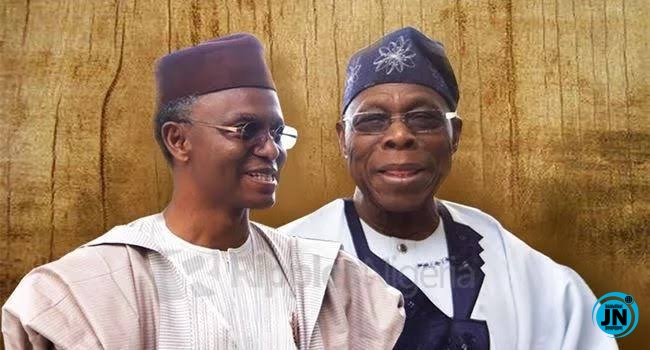Nigeria’s former Head of State, Olusegun Obasanjo, has once again stirred public discourse with his thought-provoking remarks on the state of leadership in Nigeria and the responsibilities that come with wielding political power.
Speaking passionately at the Ajibosin Platform Symposium in Abeokuta, Ogun State, the respected elder statesman emphasised that leadership is not an inheritance or a prize for ambition but a duty that must be backed by maturity, experience, and discipline.
He stressed that the country’s recurring leadership failures stem from the lack of proper grooming and mentorship, arguing that most political leaders enter governance unprepared for the complex demands of national service.

In his words, “Leadership should never be a crash course learnt on the job. It must be built through consistent character, exposure, and experience. Unfortunately, what we often see today are people who wake up one morning and think they can govern a country of over 200 million people without proper preparation.”
He humorously compared the lack of mentorship in politics to other professions that value apprenticeship, saying, “Even armed robbers have apprentices,” which drew loud laughter from the audience.
The former president explained that true leadership goes beyond power play or political ambition. It demands vision, discipline, humility, and moral conviction. He maintained that Nigeria’s future depends on leaders who understand service, not self-interest.
Chidoka urges leadership systems that outlive individuals
Former Minister of Aviation, Osita Chidoka, who delivered the keynote address, echoed Obasanjo’s concerns by stressing that Nigeria’s greatest challenge lies not in the absence of good ideas but in the inability to institutionalise leadership ethics.
He noted that while individuals may come and go, systems of accountability and good governance must remain. “A functioning democracy should not depend on the character of one person,” Chidoka said. “It must depend on the strength of institutions that track performance and hold leaders responsible.”
He called for an urgent cultural shift from personality-driven politics to performance-driven governance. According to him, moral conviction and transparency must reflect in how institutions function, not in how politicians deliver speeches.
“Accountability is the true test of leadership,” he added. “We must stop excusing mediocrity and start demanding measurable outcomes from those in power.”
Chidoka further advised that mentorship and succession planning should become a formal part of political culture to ensure continuity and stability in leadership. He praised Obasanjo for remaining an influential voice in Nigeria’s political development decades after leaving office.
Obasanjo reveals why he once rejected El-Rufai’s nomination as successor
During an interactive segment of the event, Obasanjo shared a lighthearted yet revealing story about his time in office and his decision-making process regarding succession planning.
He recalled how Osita Chidoka, then one of his aides, once suggested that Nasir El-Rufai, the former Governor of Kaduna State, had the intellect and drive to take over from him as president.
According to Obasanjo, while he acknowledged El-Rufai’s brilliance and boldness, he felt the young technocrat lacked the emotional maturity and political depth needed to lead Nigeria at the time.
“When I said El-Rufai needed to mature before handling such a huge responsibility, some people disagreed,” Obasanjo revealed. “But years later, even Chidoka himself came back to tell me I was right.”
The comment sparked laughter and applause from attendees, with Obasanjo adding that leadership is not simply about intelligence but also about patience, empathy, and the ability to handle diverse interests calmly.
He went on to say that El-Rufai remains one of the brightest minds to emerge from his administration but that leadership at the highest level requires both intellectual and emotional balance. “Brilliance without restraint can be dangerous in leadership,” he cautioned.
The symposium, which was attended by several dignitaries including Senator Shuaibu Salis, Oba Saka Matemilola, and Mrs. Olufunsho Amosun, concluded with a call for renewed emphasis on leadership education, moral discipline, and governance reforms.
Participants praised Obasanjo’s insights, describing them as timely reminders of the importance of mentorship and vision in Nigeria’s political evolution.
The event ended on a reflective note, with Obasanjo urging the next generation of leaders to embrace humility, continuous learning, and service to humanity as the foundation for sustainable governance.